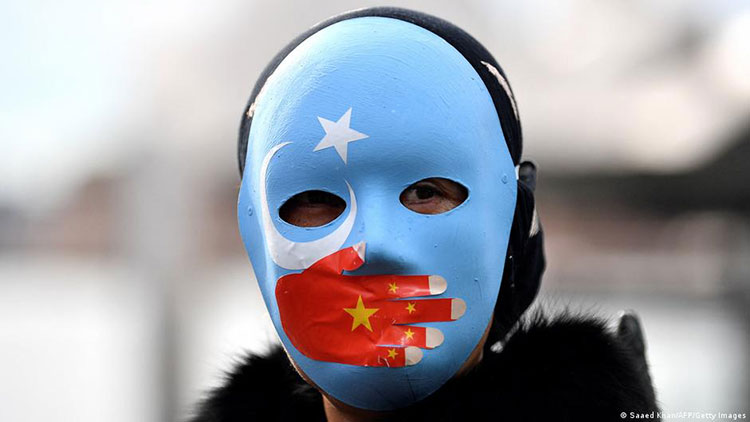Calls for a diplomatic boycott of the Beijing Olympics over China’s human rights abuses are growing louder. What can this form of protest achieve, and what are its limits?
A potential diplomatic boycott hangs over the 2022 Winter Olympics in Beijing 10 weeks ahead of the opening ceremonies.
The United States and the United Kingdom have said they are considering not sending high-level government officials to the Games in protest against ongoing human rights abuses in China. Calls for other countries to do the same are growing louder.
“We will see non-governmental organizations speaking out more intensively in the coming months, increasing the pressure on national governments,” Jürgen Mittag, a sports policy expert at the German Sports University in Cologne, tells DW.
Mittag expects the boycott discussion to peak in mid-January. Then, he says, “we will be able to see whether there really is concerted action, that is, whether a larger number of heads of state and government will not be there.
“In that case, the Olympics would certainly be damaged,” he continues, “and the Chinese government would not achieve what it actually hoped to gain from these Games: a positive presentation and thus, above all, stronger support of the country.”
Previous boycotts of sporting events
There is a long tradition of boycotts and threats of boycotts at Olympic Games for political reasons. Spain, the Netherlands and Switzerland, for example, did not participate in the 1956 Summer Games in Melbourne in protest against the invasion of Hungary by Warsaw Pact troops.
In the 1960s and 70s, sub-Saharan African countries repeatedly prevented the then-apartheid states of South Africa and Rhodesia from competing with threats of boycotts.

Following Russia’s occupation of Afghanistan at the end of 1979, 42 countries boycotted the 1980 Games in Moscow. Russia and 19 other countries returned the favor four years later by staying away from the Los Angeles Games.
In 1988, North Korea sent no athletes to the Games in the South Korean capital of Seoul, with five other countries joining in. There were also calls to boycott the 2008 Summer Games in Beijing because of human rights violations in Tibet, but little actual action came from those appeals.
How effective is a diplomatic boycott?
By comparison, a diplomatic boycott, sometimes called the politician boycott, seems like a “light” version of not sending participants to the Olympics, but only at first glance.
“In the end, depending on the intensity of this boycott, the major event may well be damaged to a certain degree,” sports policy expert Mittag tells DW.
At the 2012 European Football Championship in Poland and Ukraine, the members of the European Commission, the EU’s executive branch, and many European heads of government turned down all invitations to matches in Ukraine to protest the imprisonment of the then opposition politician, Yulia Tymoshenko.
In contrast, the absence of former German President Joachim Gauck from the 2014 Winter Games in Sochi made headlines in Germany but hardly made a dent internationally. Gauck justified his refusal by citing human rights violations in Russia.
A diplomatic boycott becomes more effective the more governments take part, says Mittag, especially when dealing with countries like Russia or China.
“China is a world political heavyweight, a global power,” he tells DW. “In this case, one will think relatively carefully about the extent to which one initiates a diplomatic boycott because it is to be feared that China will retaliate with counter-reactions elsewhere. That can lead to inconveniences that you don’t necessarily want to incur.”

Putting pressure on China
According to Amnesty International, the human rights situation in China has not improved since the 2008 Summer Games. The recent case of tennis player Peng Shuai appears to back up that assertion.
The human rights organization calls on “foreign governments to use the 2022 Winter Olympics to highlight the dramatic human rights situation and demand the sustained improvement to which the Chinese authorities have committed,” says Dirk Pleiter, China expert at Amnesty Germany, adding that such measures did not necessarily need to include boycotts.
The European Parliament already called on EU governments in early July to “decline invitations for government representatives and diplomats to attend the Beijing 2022 Winter Olympics unless the Chinese government demonstrates a verifiable improvement in the human rights situation in Hong Kong, the Xinjiang Uyghur Region, Tibet, Inner Mongolia and elsewhere in China.”
Mittag sees the Winter Games in Beijing and the subsequent World Cup in Qatar as a “litmus test” for the EU.
“The EU has made sports diplomacy a priority and has developed it into a targeted instrument, but has not yet really worked with it or only to a very limited extent,” he says.
The discussion about rainbow lighting during football’s European Championships earlier this year showed how intensively human rights are now on the sports agenda, he said.
“The relationship between sport and politics is currently being reset, renegotiated,” says Mittag. “What direction this path will take and where it will end is not yet clear.”
A diplomatic boycott of the Beijing Winter Games could provide the first clues.